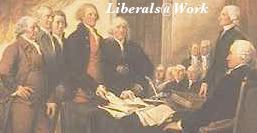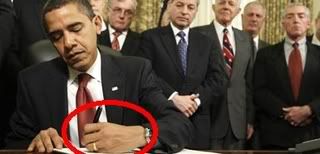No, I'm not kidding. As Atrios says, Capitalism is Awesome.
Did you write your Congress Critters yet? I did. Mind you I'm sure Marcy Kaptur and Sherrod Brown are opposed to this on progressive instincts alone, but I did remind Voinovich that this smacked of socialism. That'll get his heart pounding.
But what we're witnessing is in no way a product of socialist ideology, or any ideology for that matter. As the woman who detailed for us just how the Shock Doctrine works, Naomi Klein has a few thoughts she wants to share about all this talk of the end of the Free Market canard.
More and more I'm seeing this as an election year farce, where the administration posses what it knows is an unpalatable plan. They are proven dolts when it comes to governing, but they must have anticipated resistance to this nonsense. Klein continues:
McCain doesn't know anything about economics by his own admission. The election is turning more and more on economic issues. Let's put something out there even he isn't dumb enough to endorse, patch it up with a bunch of millionaires to oversee the stupidity -- McCain mentioned Buffet, Romney and Bloomberg to hold Hank Paulson's leash, and introduce a throw-away demand on CEO pay that'll be unenforceable and can be magnanimously withdrawn in the interest of post-partisanship.
Krugman sees him as riding the populist wave of Roosevelt, Teddy Roosevelt, the Republican. They've been discrediting and dismantling the other Roosevelt's New Deal for decades, that's the essence of Reganomics after all. The tough guy taking on the evil doers is a role designed for McCain and more fitting with his tough-guy record, masking his passion for deregulating everything from Savings & Loans to health care. At least when he's surrounded by nothing but swaggering Bush sycophants, the bellicose trust-buster type is the script they would naturally write.
You want to really know why they want this bailout and want it now? Not so Wall Street's casino economy is prevented from spilling out and creating a Depression. They want to prevent what we've been demanding right along, and realizing that the government does indeed have the means to provide it -- universal health care, social justice, a green economy, all of it. They want us to stay home and shop, not go out on the streets and demand our due. We'll only do it if we are motivated enough to get our fat lazy asses off the couch like they did in the 1930's.
We have to stop measuring progress by Wall Street's standards and establish a whole new paradigm. Naomi Klein concludes:
It's pretty obvious were in some kind of horrible economic quagmire -- yet it's still not technically a recession because growth has not dropped into negative figures, yet. Apparently we need new metrics, because measuring GDP just doesn't cut it. If we are in the middle of an economic crisis and no one can do more than debate whether a recession even exists, we're looking at the economy completely wrong.
This is no longer just an election year. This is a crossroads between a future where the New World Order of Reagan/Bush is rejected and a new social order is established under principles of common purpose for maximum benefit for all, or the further disintegration of all those fairy tales about democracy and checks and balances and justice you actually believed right up until the day your job and your house and your dreams were swept away by fiat of the Masters of the Universe.
Sept. 21 (Bloomberg) -- The Bush administration widened the scope of its $700 billion plan to avert a financial meltdown by including assets other than mortgage-related securities.This sure is looking more and more like a heist than a funding request. Is that the Hell No Choir warming up?
The U.S. Treasury submitted revised guidance to Congress on its plan a day after first submitting it, as lawmakers and lobbyists push their own ideas. Officials now propose buying what they term troubled assets, without specifying the type, according to a document obtained by Bloomberg News and confirmed by a congressional aide.
The change suggests the inclusion of instruments such as car and student loans, credit-card debt and any other troubled asset. That may force an eventual increase in the size of the package as Democrats and Republicans in Congress negotiate the final legislation with the Bush administration, analysts said.
``The costs of the bailout will be significantly higher than originally considered or acknowledged,'' said Josh Rosner, an analyst with independent research firm Graham Fisher & Co. in New York. ``How, given these changes, can the administration and Federal Reserve believe they are being forthright in their unrevised expectation of future losses?''
Did you write your Congress Critters yet? I did. Mind you I'm sure Marcy Kaptur and Sherrod Brown are opposed to this on progressive instincts alone, but I did remind Voinovich that this smacked of socialism. That'll get his heart pounding.
But what we're witnessing is in no way a product of socialist ideology, or any ideology for that matter. As the woman who detailed for us just how the Shock Doctrine works, Naomi Klein has a few thoughts she wants to share about all this talk of the end of the Free Market canard.
During boom times, it's profitable to preach laissez faire, because an absentee government allows speculative bubbles to inflate. When those bubbles burst, the ideology becomes a hindrance, and it goes dormant while big government rides to the rescue. But rest assured: the ideology will come roaring back when the bailouts are done. The massive debts the public is accumulating to bail out the speculators will then become part of a global budget crisis that will be the rationalization for deep cuts to social programs, and for a renewed push to privatize what is left of the public sector. We will also be told that our hopes for a green future are, sadly, too costly.The whole Kabuki begs the question none dare speak, except everybody who knows, including Klein, that this charade of concern for the financial markets is no less a "crisis" than the ever rising unemployment and foreclosure rates, the millions of people whose health care plan is to cut out junk food and avoid doctors, and whose idea of paying for their kids education is to buy lottery tickets.
More and more I'm seeing this as an election year farce, where the administration posses what it knows is an unpalatable plan. They are proven dolts when it comes to governing, but they must have anticipated resistance to this nonsense. Klein continues:
Americans are in no mood to trust more of their individual and collective assets to the reckless gamblers on Wall Street, especially because it seems more than likely that taxpayers will have to pay to buy back their own assets when the next bubble bursts.Tell me that this wasn't set up for John McCain to oppose, to put on display his Maverickynessitude? They may not know how to govern, but splitting the nation between simplistic sloganeering and more nuanced approaches to complicated problems is something the GOP excells at. They absolutely knew this plan would be dead on arrival, were never serious about anything but making sure stockholders and executives remained solvent, and crafted a way to exploit this mess for maximum gain.
McCain doesn't know anything about economics by his own admission. The election is turning more and more on economic issues. Let's put something out there even he isn't dumb enough to endorse, patch it up with a bunch of millionaires to oversee the stupidity -- McCain mentioned Buffet, Romney and Bloomberg to hold Hank Paulson's leash, and introduce a throw-away demand on CEO pay that'll be unenforceable and can be magnanimously withdrawn in the interest of post-partisanship.
Krugman sees him as riding the populist wave of Roosevelt, Teddy Roosevelt, the Republican. They've been discrediting and dismantling the other Roosevelt's New Deal for decades, that's the essence of Reganomics after all. The tough guy taking on the evil doers is a role designed for McCain and more fitting with his tough-guy record, masking his passion for deregulating everything from Savings & Loans to health care. At least when he's surrounded by nothing but swaggering Bush sycophants, the bellicose trust-buster type is the script they would naturally write.
You want to really know why they want this bailout and want it now? Not so Wall Street's casino economy is prevented from spilling out and creating a Depression. They want to prevent what we've been demanding right along, and realizing that the government does indeed have the means to provide it -- universal health care, social justice, a green economy, all of it. They want us to stay home and shop, not go out on the streets and demand our due. We'll only do it if we are motivated enough to get our fat lazy asses off the couch like they did in the 1930's.
We have to stop measuring progress by Wall Street's standards and establish a whole new paradigm. Naomi Klein concludes:
So what is really being called into question by the crisis is the unquestioned commitment to growth at all costs. Where this crisis should lead us is to a radically different way for our societies to measure health and progress.
None of this, however, will happen without huge public pressure placed on politicians in this key period. And not polite lobbying but a return to the streets and the kind of direct action that ushered in the New Deal in the 1930s. Without it, there will be superficial changes and a return, as quickly as possible, to business as usual.
It's pretty obvious were in some kind of horrible economic quagmire -- yet it's still not technically a recession because growth has not dropped into negative figures, yet. Apparently we need new metrics, because measuring GDP just doesn't cut it. If we are in the middle of an economic crisis and no one can do more than debate whether a recession even exists, we're looking at the economy completely wrong.
This is no longer just an election year. This is a crossroads between a future where the New World Order of Reagan/Bush is rejected and a new social order is established under principles of common purpose for maximum benefit for all, or the further disintegration of all those fairy tales about democracy and checks and balances and justice you actually believed right up until the day your job and your house and your dreams were swept away by fiat of the Masters of the Universe.
 Exposing the lack of compassion by conservatives and
debunking right wing hypocrisy at every opportunity.
Exposing the lack of compassion by conservatives and
debunking right wing hypocrisy at every opportunity.





 Subscribe via Email
Subscribe via Email
0 Comments:
POST A COMMENT